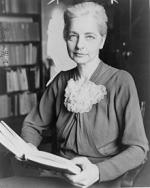Disable ads!
Ruth Benedict
Anthropology Disciplines Archaeological Biological Cultural Linguistic Social Discipline subfields Social and cultural subfields Applied Art Cognitive Cyborg Development Digital Ecological Environmental Economic Political economy Feminist Historical Kinship Legal Media Medical Musical Nutritional Political Psychological Public Religion Transpersonal Urban Visual Linguistic subfields Descriptive Ethno- Historical Semiotic Sociolinguistics Archaeological and biological subfields Anthrozoological Biocultural Evolutionary Feminist Forensic Maritime Palaeoanthropological Research framework Ethnocentrism Ethnography Ethnology Emic and etic Participant observation Online ethnography Cross-cultural comparison Holism Reflexivity Cultural relativism History of anthropology Key theories Actor-network theory Alliance theory Cross-cultural studies Cultural ecology Cultural materialism Culture theory Diffusionism Feminism Functionalism Historical particularism Interpretive Performance studies Political economy Practice theory Structuralism Post-structuralism Systems theory Key concepts Evolution Society Culture Prehistory Sociocultural evolution Kinship and descent Gender Race Ethnicity Development Colonialism Postcolonialism Value Lists Outline Bibliography Journals By years List of indigenous peoples Organizations Anthropologists by nationality Anthropology portal v t e Ruth Fulton Benedict (June 5, 1887 – September 17, 1948) was an American anthropologist and folklorist. She was born in New York City, attended Vassar College and graduated in 1909. She entered graduate studies at Columbia University in 1919, where she studied under Franz Boas. She received her Ph.D and joined the faculty in 1923. Margaret Mead, with whom she may have shared a romantic relationship, and Marvin Opler, were among her students and colleagues. Franz Boas, her teacher and mentor, has been called the father of American anthropology and his teachings and point of view are clearly evident in Benedict's work. Ruth Benedict was affected by the passionate love of Boas, her mentor, and continued it in her research and writing. Benedict held the post of President of the American Anthropological Association and was also a prominent member of the American Folklore Society. She became the first woman to be recognized as a prominent leader of a learned profession. She can be viewed as a transitional figure in her field, redirecting both anthropology and folklore away from the limited confines of culture-trait diffusion studies and towards theories of performance as integral to the interpretation of culture. She studied the relationships between personality, art, language and culture, insisting that no trait existed in isolation or self-sufficiency, a theory which she championed in her 1934 Patterns of Culture.
 Read more on wikipedia.org Read more on wikipedia.org
 All quotes by Ruth Benedict All quotes by Ruth Benedict
 Edit Edit
|

|
|
|
|
|
Background photo by Giuliana
|